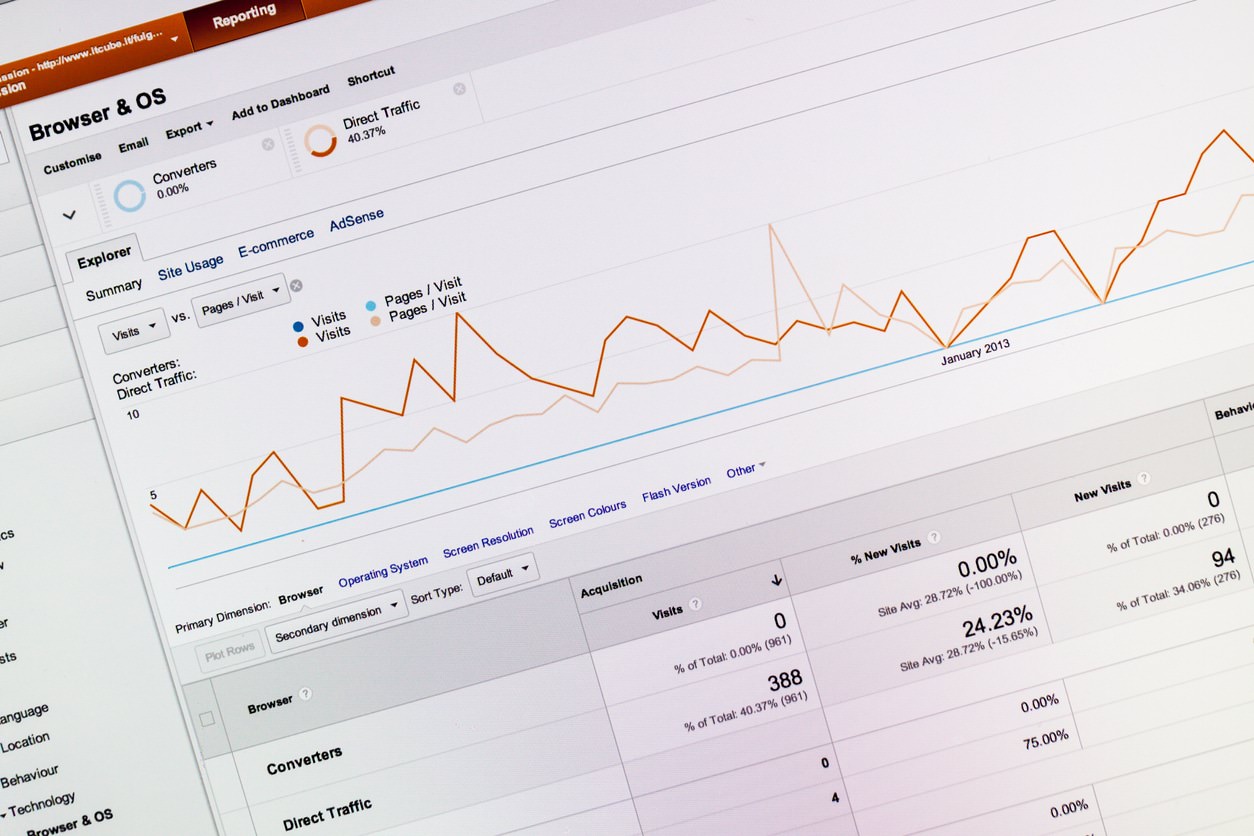Data analytics is a crucial but often overlooked area of your business. Or it falls into the I’d-love-to-do-it-if-I-had-the-time category. However, if you want your business to grow and thrive, it’s crucial to set a concrete plan in place to achieve your goals. In order for your plan to be effective, it must be data driven.
Leveraging data when creating long range plans for your business provides several important benefits:
- It eliminates instinctive, emotional decisions and shifts your focus to crafting action plans based on real-world performance insights and industry trends.
- It helps you evaluate past performance to understand what has worked and what hasn’t. This enables you to set realistic goals and adjust your business strategies as needed in order to achieve these goals.
- It helps you identify industry trends that make it easier to forecast potential opportunities for growth as well as strategies to avoid in the future.
- It allows you to more effectively evaluate the needs of your customers in order to adjust your products/services in a manner that will deliver more value and drive more sales.
- It helps you achieve companywide buy-in for upcoming initiatives. It’s much harder to question the effectiveness of a particular strategy when it is rooted in hard data.
- It ensures your team understands the main components of your business strategy and remains aligned on the tactics required to achieve your goals.
If your business is in the process of making the shift to a more data driven approach, it can be a bit daunting at first. Fortunately, there are steps to take to ensure you get this process right.
Data Analysis Should Align with Business Goals

When coming up with goals for the upcoming year, it’s best to focus on 2-4 key areas that will move your business forward. If you set too many goals, it will make it much harder to achieve any of them. By limiting to 2-4 important items, you can more effectively position your business for success in the upcoming year.
Your KPIs Will Determine the Data You Need
Once you’ve established your goals, you’ll need to identify the key performance indicators (KPIs) that will measure how successful you are at accomplishing these goals. The specific KPIs you should track will depend on the goals you’ve set.
For example, important KPIs to measure the success of a marketing goal may involve website performance metrics, social media engagement, or email open rates. If you’ve set goals for your sales team, you may want to track total sales revenue, percentage of revenue from existing vs. new clients, lead response time, or year-over-year sales growth.
The key is to identify the specific KPIs that will help you measure the success of your goals at each stage during the process you’ve established for achieving them. You can then collect the right data to evaluate your KPIs, allowing you to alter your strategy as needed over time in order to more effectively achieve your goals.
What Tools Do I Need to Leverage Relevant Data?
In most instances, you won’t be able to harvest all of the data you need from one single platform. Instead, you should plan on adopting several different tools that can help you collect and analyze the data you need. The specific tools you should use will depend on the goals you’ve set, the KPIs you’re tracking, and the data you need to gain performance insights.
The following platforms can provide important data that you can use to evaluate the success of your business goals:
- CRM – Your CRM can provide a wealth of important data. Build more detailed customer personas, allowing you to more effectively target your marketing efforts. Manage supplier information to ensure you are receiving the services you need. You can also track the success of email marketing campaigns.
- POS – You can track sales data and customer purchase information.
- Accounting software – Track how much each customer/client is paying you and how close you are to achieving your revenue goals.
This list is by no means exhaustive. There are many data systems available. Make sure to do your research and identify the right platforms to deliver the important information you need.
4 Ways to Leverage Your Data
There are many ways you can leverage data to set your business up for success. The examples below are some of the most common ways businesses use data, but there are many others. The goals you set will determine the best ways to leverage your data.
Improved Marketing Success
Data analysis is a crucial component to your online marketing strategy. It will help you evaluate the success of prior efforts to identify areas in need of improvement. Leveraging marketing data can also help you develop more innovative marketing strategies moving forward that will allow your business to grow.
There are many ways to leverage marketing data to improve your results:
- Target existing customers – It’s much more expensive to acquire new customers than to retain existing ones. You can use the insights from your marketing data to more effectively hold onto existing customers long term.
- Target new customers – While it’s important to retain your existing customer base, you still need to continuously add new customers to ensure your business grows over time. Data is crucial to your ability to market your services and products more effectively by delivering messages that resonate with your target audience.
- Identify new opportunities – The data you collect about customer behavior patterns and overall market conditions will help you discover new opportunities as they arise. You can then develop targeted marketing campaigns to more effectively capitalize on these opportunities.
- Track the performance of your efforts – You can track a wide range of metrics which will help you evaluate the success of your campaigns. Some valuable metrics to monitor include:
- Keyword performance
- Click through rates
- Bounce rates on web pages
- Time on page/time on website
- Social media views, shares and likes
- Email open rates
- Total number of page views
The ways to leverage marketing data are virtually limitless. It can elevate your marketing efforts so that you can set your business up for sustained long term growth.
Competitive Advantage
The competition in most industries is fiercer than ever. Data can provide the intelligence and insights you need to improve your decision making and gain a competitive advantage for your business. You can leverage data to improve many aspects of your operations, including:
- Research and development
- Forecasting and planning
- Budgeting
- Performance management
- Pricing strategies
- Improving customer experience
Improved Business Outcomes

Some important business outcomes that can be improved by leveraging your data include:
- Productivity – You can leverage data regarding the way your resources are used to improve your processes and increase productivity.
- Service quality – If your business provides services, you can leverage data to identify what your customers like in terms of service features and offerings, as well as the things they don’t enjoy. This information can improve your overall service quality to deliver a better customer experience.
- Product quality – In most instances, better quality products will help you build a solid reputation in your industry and improve customer satisfaction. You can leverage customer feedback data from surveys and social media to determine how to improve the design and quality of your products.
Create Value
Providing high quality products and services are crucial to the success of your business. However, quality isn’t the only factor that drives purchasing decisions. Your potential customers and clients also want to feel like they’re getting good value if they’re going to enter into a long-term relationship with a business. By creating this value, you can stand out from your competitors and grow your customer base.
Data can be used to create value for your customers in a variety of ways:
- You can leverage data to provide insights and recommendations for your customers, delivering a better overall experience than is possible by simply providing a product or service.
- You can use data you’ve collected to help guide customers through their decision-making process to ensure they purchase the right product. This can elevate the way you’re perceived by customers and develop a deeper level of trust that leads to loyalty over time.
- You can also leverage data to identify the aspects of your products and services which resonate most strongly with your customers. This can help you focus on these features in order to ensure your customers are receiving what they need, when they need it.
Transforming Your Business into a Data-Driven Organization

- Set clear business goals and the KPIs associated with these goals.
- Identify the appropriate data tools to provide the information you need and invest in these tools.
- Assemble a team to analyze the data you’re collecting and provide recommendations that will achieve your goals. Make sure to provide all necessary training for team members who will be implementing new tools that they are unfamiliar with.
- Create a roadmap for executing the initiatives identified by your data analysis.
- Continue to evaluate your strategy over time in order to refine your processes and improve your outcomes.
Webolutions Can Provide the Data-Driven Recommendations You Need
Setting up all the infrastructure to collect and leverage the right data to grow your business can be an overwhelming process. Often, it can be helpful to work with a digital marketing agency who can deliver the data insights you need to properly plan for the future.
At Webolutions, we can help ensure you have the right data at your disposal, and we can guide you through the process of establishing the right initiatives to grow your business. We are the only strategic communications agency in the United States delivering a transformational Power of You Platform™ to grow your business faster, smarter and easier. As part of this process, we create Real-Time Performance Intelligence Dashboards™ that provide you with thoughtful and organized real-time graphical performance models which allow you to see the critical information and trends that will drive your business success.
Our team will also analyze the data for you in order to make customized recommendations geared towards achieving the specific goals you establish. The information and recommendations we provide will help you craft a strategic plan for the upcoming year that will ensure your team remains focused on the important initiatives necessary thrive in this competitive business landscape.
Contact us today to schedule a consultation. We serve clients nationwide from our offices in Denver, Colorado.

